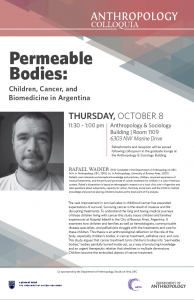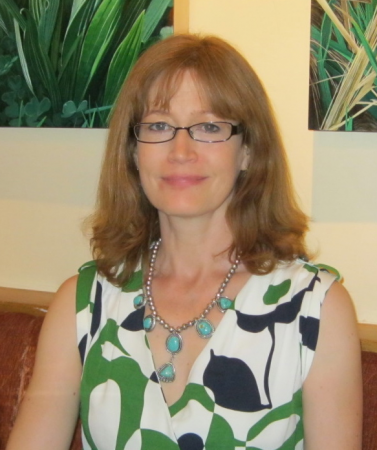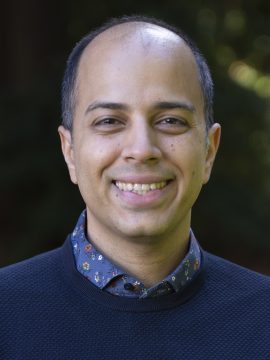Anthropology Colloquium is the department’s speaker series that invites a mixture of anthropologists from within and outside of UBC to present their research. This speaker series is scheduled throughout the academic year, typically with a lunch reception in the AnSo Lounge.
Permeable Bodies: Children, Cancer, and Biomedicine in Argentina


Thursday, October 8 2015
Anthropology and Sociology Building (ANSO) 1109
11:30am-1pm
Event Poster: PDF
Rafael Wainer
M.A. in Anthropology, UBC, 2008
Lic. in Anthropology, University of Buenos Aires, 2005
Abstract
The vast improvement in survival rates in childhood cancer, especially in childhood leukemia, has expanded expectations of survival. Surviving cancer is the result of invasive and life- disrupting treatments. To understand the long and taxing medical journeys of these children living with cancer this study traces children and families’ experiences at Hospital Infantil (public Children’s Hospital) in the City of Buenos Aires, Argentina. It examines how children and families as well as hematologists, communicable disease specialists, and palliativists struggle with the treatments and care for these children. This thesis asks: How does a “sick child” overcome a life-threatening illness such as a cancer and its painful treatments to become a “cancer survivor” living “life without illness” in the global south, particularly in a country like Argentina? This question leads to an anthropological reflection on the role of the body, especially children’s bodies, in cancer treatment, palliative care, and cure. It pays careful attention to issues of corporeality and subjectivity. The thesis examines how bodies work interactively while being the object of invasive and painful biomedical interventions. These interventions not only affect children but also their families and the professionals themselves.
This ethnography investigates the potentials and perils of pediatric cancer treatment in its specific Argentinean context and the importance of carefully looking at the body to understand children, families, and professionals’ practices that aim for a life without cancer. By focusing on the production of “permeable bodies” this study argues that cancer treatment turns children’s bodies into permeable bodies, bodies painfully turned inside out, as a way of producing knowledge and an urgent therapeutic relation that stretches in multiple dimensions. Children become the embodied objects of cancer treatment.
Bio
Rafael is a PhD Candidate in the Department of Anthropology at UBC under the Supervision of Dr. Bill McKellin. His main interests are biomedical knowledge and practices, children, corporal experience of medical treatments, and the perils and promises of cancer treatment for children in a Latin American context. Rafael is particularly interested in the multidimensional strategies in relation to the provision of (social and medical) care to children experiencing cancer, and the distinct experience children, families, and different health professionals come across in their everyday lives. Rafael’s dissertation is based on ethnographic research on a local clinic site in Argentina and asks questions about subjectivity, capacity for action, the body, social care, and the limits to medical knowledge and practice placing children’s bodies as the focal point of my analysis.


